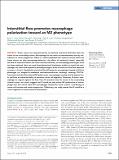Interstitial flow promotes macrophage polarization toward an M2 phenotype
Author(s)
Serrano, Jean Carlos; Zaman, Muhammad; Li, Ran; Xing, Hao; Lee, Tara A.; Azizgolshani, Hesham; Kamm, Roger Dale; ... Show more Show less
Downloadmbc.e18-03-0164.pdf (5.502Mb)
PUBLISHER_CC
Publisher with Creative Commons License
Creative Commons Attribution
Terms of use
Metadata
Show full item recordAbstract
Tumor tissues are characterized by an elevated interstitial fluid flow from the tumor to the surrounding stroma. Macrophages in the tumor microenvironment are key contributors to tumor progression. While it is well established that chemical stimuli within the tumor tissues can alter macrophage behaviors, the effects of mechanical stimuli, especially the flow of interstitial fluid in the tumor microenvironment, on macrophage phenotypes have not been explored. Here, we used three-dimensional biomimetic models to reveal that macrophages can sense and respond to pathophysiological levels of interstitial fluid flow reported in tumors (∼3 μm/s). Specifically, interstitial flow (IF) polarizes macrophages toward an M2-like phenotype via integrin/Src-mediated mechanotransduction pathways involving STAT3/6. Consistent with this flow-induced M2 polarization, macrophages treated with IF migrate faster and have an enhanced ability to promote cancer cell migration. Moreover, IF directs macrophages to migrate against the flow. Since IF emanates from the tumor to the surrounding stromal tissues, our results suggest that IF could not only induce M2 polarization of macrophages but also recruit these M2 macrophages toward the tumor masses, contributing to cancer cell invasion and tumor progression. Collectively, our study reveals that IF could be a critical regulator of tumor immune environment.
Date issued
2018-07Department
Massachusetts Institute of Technology. Department of Biological Engineering; Massachusetts Institute of Technology. Department of Mechanical EngineeringJournal
Molecular Biology of the Cell
Publisher
American Society for Cell Biology
Citation
Li, Ran et al. “Interstitial Flow Promotes Macrophage Polarization Toward an M2 Phenotype.” Edited by Valerie Marie Weaver. Molecular Biology of the Cell 29, 16 (August 2018): 1927–1940 © 2018 Li et al.
Version: Final published version
ISSN
1059-1524
1939-4586